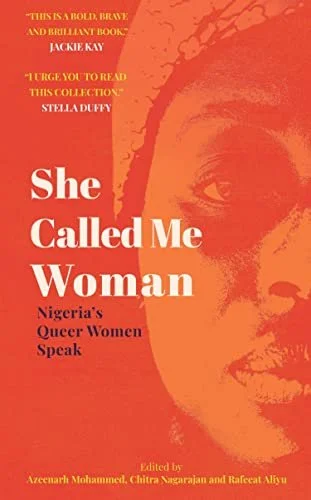She Called Me Woman - Nigeria’s Queer Women Speak
“We decided to put together this collection of thirty narratives to correct the invisibility, the confusion, the caricaturising and the writing out of history.”
This stirring and intimate collection brings together 30 unique narratives to paint a vivid portrait of what it means to be a queer Nigerian woman. Covering an array of experiences – the joy and excitement of first love, the agony of lost love and betrayal, the sometimes-fraught relationship between sexuality and spirituality, addiction and suicide, childhood games and laughter – She Called Me Woman sheds light on how Nigerian queer women, despite their differences, attempt to build a life together in a climate of fear.
Through first-hand accounts, She Called Me Woman challenges us to rethink what it means to be a Nigerian ‘woman’, negotiating relationships, money, sexuality and freedom, identifying outside the gender binary, and the difficulties of achieving hopes and dreams under the constraints of societal expectations and legal terrorism.
She Called Me Woman is full of beautifully told stories of resistance and resilience, joy and laughter, heartbreaks and victories, collecting the realities of a community that will no longer be invisible.
Co-edited with Azeenarh Mohammed and Rafeeat Aliyu
Get the book here:
What People Are Saying
“This is a book that details the political vulnerability attached to LGBT lives, but it is also an account of the joy, hope, love, and community found within those lives. When Western writers try to tell African people’s stories, there’s an ever-present danger of the narrative devolving into tragedy or inspiration porn — both of which are ultimately dehumanizing, because nuance is lost when catering to a white and Western gaze. Only when African people tell their own stories, unfiltered, is that risk of Othering removed. There is real heart in She Called Me Woman, because each interviewee tells her own story in her own way. This raw, unmitigated honesty gives their testimonies real power.”
— After Ellen
“Art is most beautiful when we find pieces of ourselves in it, when it resonates with our realities or what we want our realities to be. She Called Me Woman: Nigeria’s Queer Women Speak transcends beautiful. This history-making opus will shake the tables our collective homophobia—internalised and externalised—sits on. Its daringness will embolden us to take off the heavy, dark, velvety silence that has draped talks of Other sexualities.”
— Brittle Paper
“The trio of editors – Azeenarh Mohammed, Chitra Nagarajan and Rafeeat Aliyu – have done the laudable work of collecting first hand narratives from every political zone in Nigeria with a measured but clear objective not to “provide a comprehensive picture but rather snapshots of histories, experiences and realities” of being a queer woman in Nigeria. “She Called Me Woman” also works as a strong rebuttal to the Same-Sex Marriage Prohibition Act which the country’s parliament passed in 2013 and was signed into law by President Goodluck Jonathan in January 2014.”
